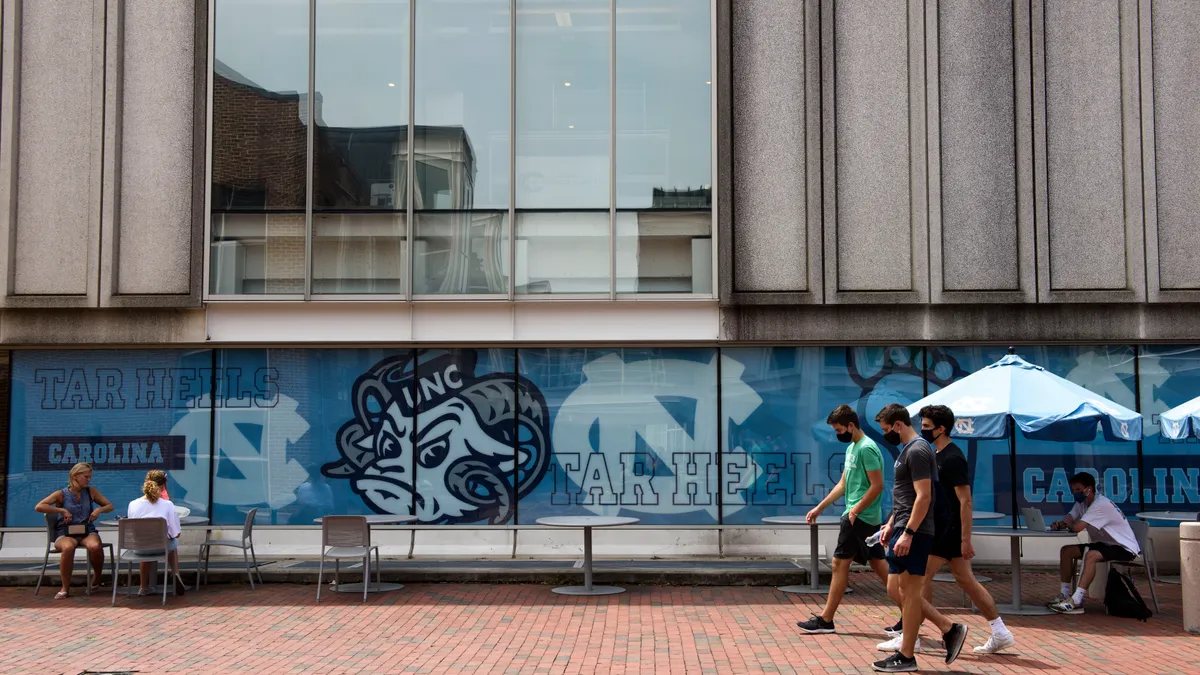UPDATE: Nov. 12, 2021: Anti-affirmative action group Students for Fair Admissions on Thursday appealed to the U.S. Supreme Court a District Court decision that the University of North Carolina at Chapel Hill's race-conscious admission practices are legal.
SFFA is similarly appealing to the high court a ruling in favor of Harvard University.
"Every year, thousands of college applicants have been subjected to unfair and unconstitutional racial classifications and penalties by our nation's most competitive institutions," SFFA president and founder Edward Blum said in a statement. Blum called for ending the practices "as soon as possible."
Dive Brief:
- The University of North Carolina at Chapel Hill can continue to incorporate race as a factor in its admissions processes, a federal judge ruled Monday, dismissing an argument by an anti-affirmative action group that the flagship institution discriminated against White and Asian-American applicants.
- UNC-Chapel Hill narrowly tailors the use of race in admissions, falling in line with legal precedents, and does not pursue unlawful racial quotas, U.S. District Judge Loretta C. Biggs wrote in court filings.
- The challenge to UNC-Chapel Hill's policies came from conservative legal organization Students for Fair Admissions, whose founder is aiming for the U.S. Supreme Court to end race-conscious practices in a similar case against Harvard University. SFFA is also vowing to appeal the UNC ruling.
Dive Insight:
The ruling represents the latest in a string of legal setbacks for SFFA, headed by Edward Blum, a prominent conservative attorney known for challenging affirmative action rules.
A federal judge in 2019 rejected SFFA's claims that Harvard's admissions policies disadvantaged Asian-American students. In 2016, Blum, in a 4-3 Supreme Court decision, lost an affirmative action complaint against the University of Texas at Austin. A federal judge this year threw out another SFFA lawsuit against the institution, deeming it too alike to the previous case.
Despite SFFA's losses in court, the landscape around race-sensitive admissions is shifting. The Supreme Court surprised some observers when it sided with UT-Austin in 2016, as the author of the majority of the opinion in that case, Justice Anthony Kennedy, was skeptical of affirmative action. Today's top court has a clear conserative majority and has signaled its willingness to reconsider affirmative action policies.
In a statement, Blum said SFFA will take the UNC-Chapel Hill ruling to the U.S. Court of Appeals for the Fourth Circuit and the Supreme Court.
"Students for Fair Admissions is disappointed that the court has upheld UNC’s discriminatory admissions policies," Blum said. "We believe that the documents, emails, data analysis and depositions SFFA presented at trial compellingly revealed UNC’s systematic discrimination against nonminority applicants."
But Biggs, the judge, decidedly disagreed. Biggs wrote that she could find no evidence the university "conceals the improper use of race behind opaque procedures" or that officials have inadequately reflected on the role it plays in admissions, as SFFA alleged. The group first sued the UNC system in 2014.
UNC-Chapel Hill proved it took race into account, but only alongside such other metrics as standardized test scores and extracurricular activities, Biggs wrote. It has also studied race-neutral alternatives. In fact, she wrote, the university could improve efforts to support a diverse student body.
"Nearly seventy years after the first black students were admitted to UNC, the minority students at the University still report being confronted with racial epithets, as well as feeling isolated, ostracized, stereotyped and viewed as tokens in a number of University spaces," Biggs wrote, adding that underrepresented minority students as a whole are admitted at lower rates than their White and Asian-American counterparts.
She also called attention to flaws of an SFFA analysis of UNC admissions data. To measure race "only by statistical models as SFFA has done, misses important context to include obscuring racial barriers and obstacles that have been faced, overcome and are yet to be overcome," she wrote.
The university praised the ruling. It made clear the university's "holistic admissions approach is lawful," Beth Keith, an associate vice chancellor at UNC-Chapel Hill, said in an emailed statement.
"We evaluate each student in a deliberate and thoughtful way, appreciating individual strengths, talents and contributions to a vibrant campus community where students from all backgrounds can excel and thrive," Keith said.
Supreme Court precedents have cemented the extent race can play a part in college admissions, including in 2003, with a landmark decision in Grutter v. Bollinger. The high court in that ruling backed race-conscious admissions seeking educational benefits from a diverse student body, so long as colleges took into account other factors.
The U.S. population doesn't widely support race-conscious admissions, however. A Pew Research Center survey in 2019 revealed nearly three-quarters of Americans don't think colleges should factor in race. And even in blue California, voters last year refused to overturn the state's ban on race-conscious policies. Experts said then the contentious presidential election and the pandemic likely distracted voters, but also that misinformation around affirmative action is common.














